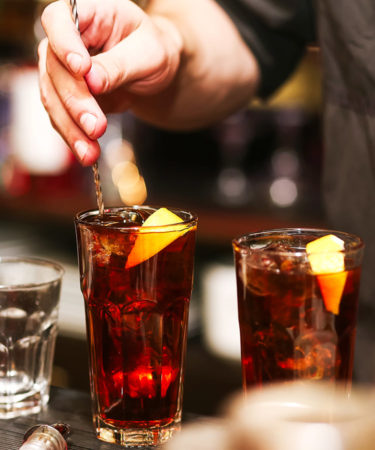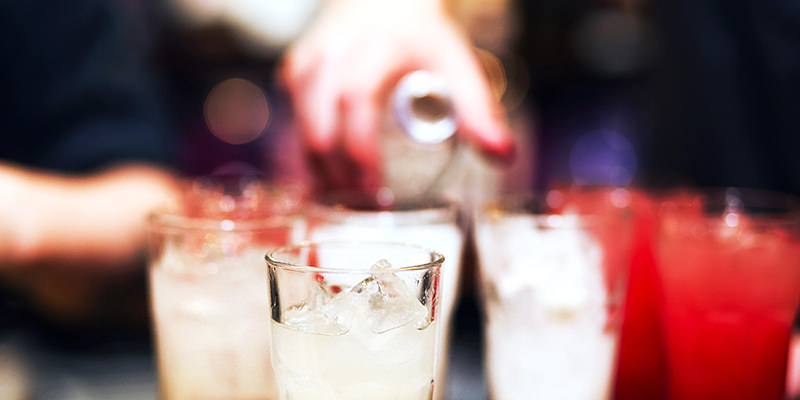I’m going to quote the obnoxious, albeit catchy Sammy Adams song All Night Longer:
Tell that bartender
Make that motherf*@!er stronger
I wanna go all night longer
A couple rounds going down like waaaaa-ter
I wanna go all night longer!
Most of us aren’t sensitive to profanity, so why is this lyric so irritating? Well, let’s focus on the line “make that motherf*@!er stronger.” The thing is, asking a bartender to make your drink strong (in this case, stronger) is a bit of a faux-pas, and who wants to commit one of those?
First, let’s clarify what we mean when we say “make a drink stronger.” We mean: you want the drink to have more booze in it.
Let’s say you’re at a craft cocktail bar ordering a specialty drink on the menu. It’s totally fine to ask for additional liquor in your drink, but be cognizant of the fact that you’re changing the taste of the drink, particularly when it’s multi-ingredient, original cocktails. To make a food analogy, if you order a restaurant’s special chocolate cake and ask for butterscotch to be poured on top, the kitchen will probably comply, but your cake is not going to taste as they intended it to. Therefore, you’re eating at your own risk. The same situation is applicable at a cocktail bar. If you order the house’s special tequila cocktail but want to double the dose of tequila, it’s fine, but your drink may taste weird. Matt Friedlander, head bartender at Fool’s Gold, explains, “Guests do need to keep in mind that the cocktails on our list have been researched, developed, tasted and tweaked to what we consider the best delivery of flavor and balance. Adding more booze throws that off.”
Now let’s say you’re just ordering a very basic cocktail, like a whiskey and coke. In this scenario, why can’t you ask for the drink to be stronger? It’s not a special cocktail, it’s just a whiskey coke. Who cares if you mess with the proportions? It’s not exactly sacred. The problem here is that when most people order a drink like this “stronger,” they expect their drink to come out with more booze for the same price, as if they’d just ordered the drink as it stands. They’re then the surprised when their bill arrives and there’s an additional cost.
To help you understand why that extra booze costs extra dollars, we’ll make another food analogy. Let’s say you order truffled pasta, and you ask for extra truffle shavings. You will be upcharged. Even if you add avocado or tomatoes, you’ll still be upcharged. Extra ingredients cost extra money. You wouldn’t think twice about this at a restaurant. So, when you ask for a drink to be made “stronger” at a bar, what you’re really asking is for more liquor to be added, so you will get charged more. Liquor is pricey – pricier than tomatoes or avocados (and sometimes truffles as well), so you will be charged accordingly when you ask for more of it.
Now, we’re sure there are people who, when they order a drink “strong” mean that they want the bartender to actually lessen the other ingredients in the drink to make the booze really stand out. In this case, make this very clear to the bartender. However, particularly in the case of craft cocktails, this might not be the best idea. Case in point: one of our friends once asked to cut the simple syrup in a drink so the results would taste “stronger.” He was not pleased with his decision. Sometimes, your bartender might know your palate even better than you do.
So what if you want to order a drink with extra booze, and you’re totally comfortable paying for it. What then? Can you still not ask for the bartender to make your drink stronger? You could but the proper way to ask for your drink to be “stronger” is by ordering a double. Matt breaks it down for us, saying that if you’re craving a little more booze,“Order a double. Or an extra shot on the side. But know, we’re charging you for it!”
This isn’t a jerk move on behalf of the bar, it’s simply a way of having you pay for what you order. Just like when it comes to tipping, if you think of a round of cocktails the same way you think of dining out, it makes a lot more sense that a “double” drink will cost more than if you were to have it as-is.

